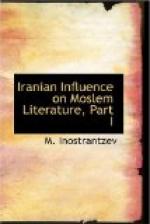[Sidenote: English translation of the Introduction a desideratum.]
So far as I know, of this chapter there is no translation in a European language except in the English by Knatchbull which appeared in 1819, which reproduced the imperfect text of de Sacy and is otherwise defective. Wolff did well to omit it in his German translation of Kalila wa Dimna of 1837, for he could not have produced a correct rendering of de Sacy’s text which was not completed till 1873 by Guidi.
[Sidenote: Difficulties of translation.]
Even now it is impossible to make a translation of Burzoe’s Introduction which can stand the test of philology. We must first see whether with the use of all available manuscripts and a careful collation of other text sources we cannot arrive at a tolerably settled Arabic text. And that is, so far as I can conclude from my not quite insignificant material, not very probable. At all events a searching examination of all the manuscripts in the great Paris library is essential. The various texts of the book are considerably divergent. Arbitrariness and carelessness of transcriber have disfigured Ibn Moqaffa’s work of art just because it presently became a favourite book of entertainment. The language at all events remains approximately correct in the manuscripts.
Grammatical mistakes easy of correction are not seldom met with but pure vulgarisms occur only in a few copies like that of Berlin. The numberless variants have not much significance for the translator when it is only a question of synonyms, since for them the same European expression can do duty. And though it is not certain whether in the case of a multitude of non-essential or wholly analogous expressions the shorter or the extended text is the original one, that does not substantially affect the translation. There is scarcely any harm in curtailing the frequent tautology of this chapter. We should be well advised in case of successive synonymous abstract nouns and verbs such as occur frequently in Arabic to translate by a simple expression with an emphatic adjective or adverb. But not seldom the difference becomes great. It is a difficult situation when we are uncertain whether the passage which is found in several manuscripts and not in others is the original one. As a rule we have to decide in favour of the majority but as sometimes we do come across actual interpolations in some, so their existence is not impossible in others, although we can not be positive on the subject.
[Sidenote: A monumental piece of literature.]
The matter would have been less troublesome for me had I been able straight way to declare as the best the tradition of any of the manuscripts familiarly known to me or any old translation. That, however, is not so. I have to judge each case by itself and to proceed eclectically as much as my philological conscience permits. Finally, by means of my rendering I believe I have reproduced the import of this monumental piece of literature without showing absolute partiality to the Arabic document. My rendering is wanting doubtless in the elegance with which Ibn Moqaffa handles the language which in his time had acquired the capacity of treating even abstract subjects with lucidity. May a later hand improve upon my translation!




